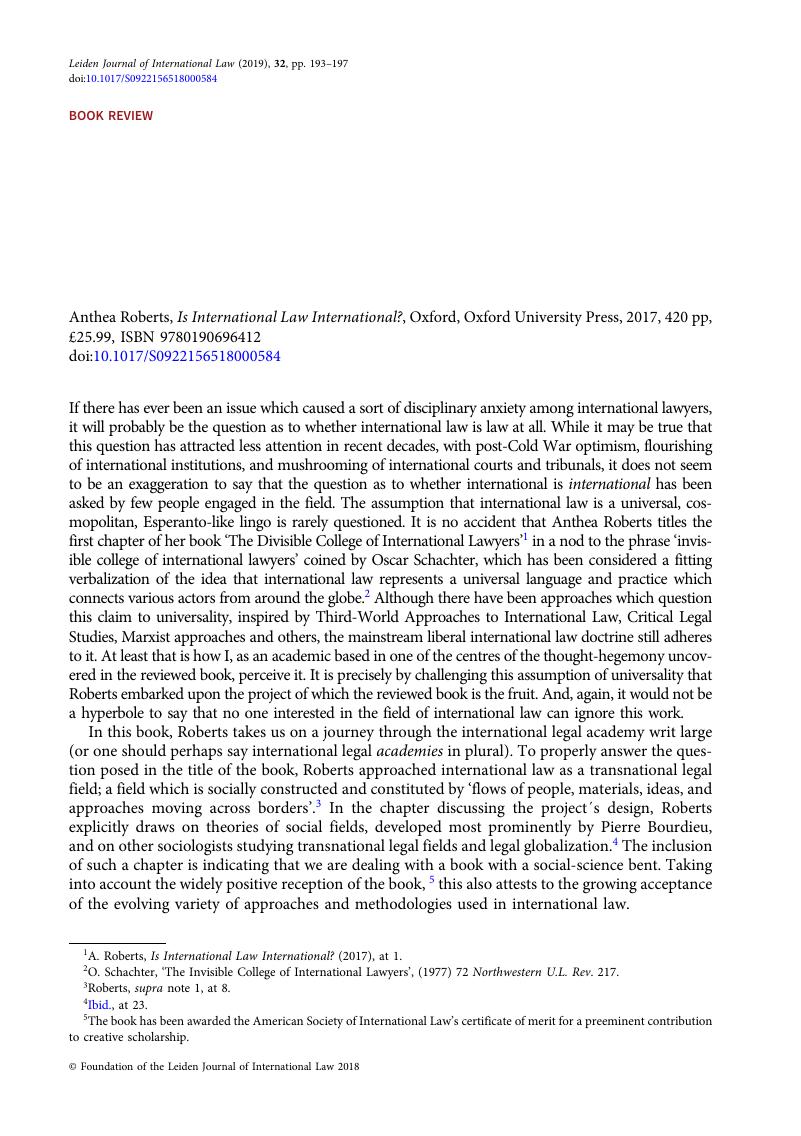Published online by Cambridge University Press: 01 March 2019

Lecturer at the Geneva LL.M. in International Dispute Settlement (MIDS); Senior Researcher at the Geneva Center for International Dispute Settlement (CIDS) [[email protected]].
1 Roberts, A., Is International Law International? (2017), at 1Google Scholar.
2 Schachter, O., ‘The Invisible College of International Lawyers’, (1977) 72 Northwestern U.L. Rev. 217Google Scholar.
3 Roberts, supra note 1, at 8.
4 Ibid., at 23.
5 The book has been awarded the American Society of International Law·s certificate of merit for a preeminent contribution to creative scholarship.
6 E.g., Roberts, A., ‘Triangular Treaties: The Extent and Limits of Investment Treaty Rights’, (2015) 56 Harvard I.L.J. 353Google Scholar; Roberts, A., ‘State-to-State Investment Treaty Arbitration: A Hybrid Theory of Interdependent Rights and Shared Interpretive Authority’, (2014) 55 Harvard I.L.J. 1Google Scholar; Roberts, A., ’Clash of Paradigms: Actors and Analogies Shaping the Investment Treaty System’, (2013) 107 AJIL 45Google Scholar; Roberts, A., ’Power and Persuasion in Investment Treaty Interpretation: The Dual Role of States’, (2010) 104 AJIL 179CrossRefGoogle Scholar.
7 Roberts, supra note 1, at 185–208.
8 Ibid., at 28–35.
9 Ibid., at 39–43.
10 Needless to say, international law as an academic discipline is not united in its approaches, theories and methodologies, even within one national legal academy or even within one university. See, e.g., A. Bianchi, International Law Theories (2016). However, Roberts·s focus in this book is on the basic textbooks and curricula of the courses teaching fundamentals of international law, i.e., what we may call black letter or doctrinal international law textbooks.
11 Roberts, supra note 1, at 4.
12 Ibid., at 6.
13 The reviewed book was shortly followed by a collaborative edited volume devoted to the approach: Roberts, A., Stephan, P.B., Verdier, P.H. and Versteeg, M. (eds.), Comparative International Law (2018)CrossRefGoogle Scholar, and preceded by a symposium ·Exploring Comparative International Law· published in (2015) 109 (3) AJIL as well as by a journal article; Roberts, A., ’Comparative International Law? The Role of National Courts in Creating and Enforcing International Law’, (2011) 60 ICLQ 57CrossRefGoogle Scholar.
14 B. de Sousa Santos, Toward a New Legal Common Sense: Law, Globalization and Emancipation (2002), 179.
15 Roberts, supra note 1, Ch. 3.
16 Ibid., at 43–6.
17 Ibid., at 44.
18 Ibid., Ch. 4.
19 Ibid., at 211–18.
20 Ibid., at 277–99.
21 Ibid., at 48.
22 Ibid., at 322.
23 Ibid., at 324.
24 Ibid., at 48.
25 Ibid.